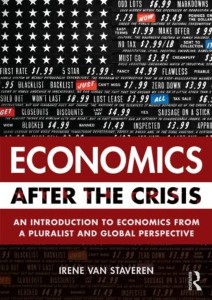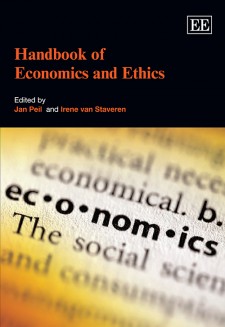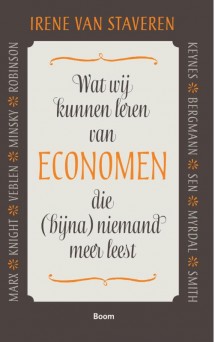There is a useful interview with Bill Mitchell of December 2014 on Modern Monetary Theory (MMT) and unemployment. My only comment on this interview is that one should be aware that Mitchell gets wrong information from Holland, see this discussion.
Thinking about money I wondered about Bernard Lietaer. He has an impressive CV, so I watched most of this interview with him too. It appears that I can make the following comments. The main one is that Lietaer gets wrong information from Holland too. Apparently no one told him yet about the censorship of science at the Dutch Central Planning Bureau since 1990 and the relevance for his analysis on money.
Interest causes the need for growth ?
Question 3 “Why is money scarce?” gives Lietaer’s answer in minute 3-4 that interest mathematically would cause the need for growth. Consider an economy where all loans are $ 100 bn, and where all borrowers must pay an interest of 3%. Then the loans can only be repaid with interest to the sum of $ 103 bn, if, it is claimed, there is some growth of at least 3%. If there is less growth, then some borrowers would be forced into higher debt. In the past I have wondered about this phenomenon too. When you imagine that all loans are exactly from January 1 to December 31 then the argument seems to be compelling.
However, when I looked at this closer, I found the argument wanting. For, the 3% would be earnings by the banking system too, and thus be spent and injected into the economic cycle. Not all loans are exactly from January 1 to December 31. For this weblog article, I planned to make a diagram with the proper argument, but checked on google first whether someone had already debunked Lietaer’s argument. Indeed, Johan Rönnblom already gives a fine discussion with a diagram. He actually has some other good articles too (like on the Jesus myth).
Silvio Gesell’s decay / demurrage / negative interest
Lietaer repeats Silvio Gesell’s argument on money with decay or demurrage or negative interest. For example, a Decay-Euro might lose 2% of its value next month, so that you would have an incentive to spend it. He gives the example that this worked well in Egypt for 2000 years.
However, we already have decay with inflation. Also, when part of your money earns interest in a bank, then the other part with no return has a relative penalty. These incentives are lost when there is deflation and a zero rate of interest, as has been the case nowadays. But there are other ways to bring money into circulation. (My conclusion is the need for national investment banks.)
Thus, there is no need for Silvio Gesell’s argument in this particular form. J.M. Keynes already though Gesell an interesting author because he pointed to the incentives to spend or hoard money, but there it stops.
Ecosystem of monies
Lietaer argues that a monoculture runs a large risk so that it is better to have an ecosystem of more monies.
This is somewhat problematic. W.r.t. Question 21 on the Euro, Lietaer appears to be in favour of it. But in subsequent discussion he states that his original wish was that all Eurozone nations had also kept their own currencies. This however is dubious. When we look at the case of Cuba with its CUC and CUP and informal use of the dollar (which the CUC is linked to), then this advice by Joseph Perry et al. is that the dollar should not be legal tender. Supposedly bad money drives out good money, but this applies to the hoarding of the good money, so that only the bad money is in circulation. The situation is different when the good money is amply available and doesn’t need to be hoarded. If the dollar would be legal tender then apparently it would annihilate the use of CUC and CUP. The mentioned advice refers to Panama and its use of the dollar. Thus, Lietaer’s preference for dual monies in the Eurozone cannot be maintained. If in Greece both Euro and Drachme would be legal tender, and be used to calculate and pay taxes, and when the Drachme would obviously tend to drop in value, then people would flee towards the use of the Euro. The use of a dual money would not only be against the spirit of the Eurozone but also be counterproductive, causing a resentment against the Euro that causes a devaluation of the Drachme.
I have the impression that the problem is rather nonexistent. What is important is the design of the system of money and banking with a single currency.
Obviously, when you don’t have a good design, then it might be a solution to have various monies with various designs in parallel, and hope that one of them works. But we already know plenty about money and there is no need for experimenting. Best is the observation that the Euro has a bad design, and that politicians did not pay sufficient attention to scientific advice. Each nation needs an Economic Supreme Court (ESC), to warrant the quality of information for policy making.
Complementary monies
The same holds for complementary monies like the Swiss WIR. There is no real need for them. It would not really differ from starting a community bank that has more creative criteria for credit. One might avoid taxes perhaps. I can imagine that complementary monies can work in times of crisis and a government that is fixed on some gold standard or so. For economists, however, the proper analysis should rather be criticism on the government for wrong policies and the absence of an Economic Supreme Court. For economists, the objective remains that people would use legal tender, and thus also be in the position to prosper in doing so.
World money
The world would be helped with a world currency. The current system with IMF and Worldbank would better be replaced with a more developed one (Keynes: “The fund is a bank, and the bank is a fund !”). The current system is remarkably resilient, perhaps also because of Lietaer’s involvement with floating exchange rates and the ECU. Yet there may be tough times ahead, and we should be able to make arrangements with the experience that we have. The notion of an optimal currency area goes against world money, but see my amendment in Money as gold versus money as water. Curiously, Lietaer also suggests to think about world money, but his proposal of an ecosystem would seem to go against it.
Supposedly a taboo ?
On Question 10 about the lack of discussion on these issues, Lietaer suggests that money is a taboo. I wonder. There are ample economists who study money. When some of Lietaer’s arguments aren’t convincing then this doesn’t necessarily mean that there isn’t enough discussion.
More reading
For a discussion about money, this article by Goodhart & Jensen is quite useful. (I thank H. Visser (VU) for alerting me to this.)
Let me refer also to my earlier discussion of the gold bugs and the paper Money as gold versus money as water.
Club of Rome: Money and sustainability: The missing link
There is also Lietaer’s book for the Club of Rome – and Finance Watch (with executive summary):
“Just as The Limits to Growth exposed the catastrophic flaws in our economic system, this new Report from the Club of Rome exposes the systemic flaws in our money system and the wrong thinking that underpins it. It describes the ongoing currency and banking crises we must expect if we continue with the current monopoly system – and the vicious impact of these crises on our communities, our society as a whole and our environment.”
- I haven’t read this book. Here are reviews.
- I am sympathetic to the subject area, see my draft book on the analysis by Tinbergen & Hueting on the economics of ecological survival. See Hueting’s site.
- I am afraid that the presumed mathematical necessity from interest to growth forms part of the argument, which has been debunked above.
- A bad system of money and banking will obviously hamper the economy, and thus also environmental sustainability. But the issues are logically independent. The summary by Dennis Meadows in the Preface (excecutive summary) doesn’t indicate to me that we can expect a proof of logical dependence.
- A good system of money and banking is here: Money as gold versus money as water and the suggestion by Kotlikoff.
Dennis Meadows still isn’t an economist
The mentioned preface by Meadows has some relevance here. Meadows is an engineer (systems dynamics) (like Lietaer started out too) but his report “limits to growth” was criticised by economists for not having prices, income effects and substitutions. Apparently, Meadows never took up the challenge to study economics, and now he is taken in by Lietaer’s incomplete economic analysis on money as if this would be the true story.
“I did not think about the money system at all. I took it for granted as a neutral and inevitable aspect of human society.” (Meadows, Executive Summary, p6)
Well, any macro economist has money as a subject in his or her training, and all would know that the idea of “money is a veil” is only a particular assumption (which students might later forget, that is true).
“a devastating critique of traditional economic thinking” (Meadows, p7)
He cannot say so, since he didn’t study economics and thus cannot judge about what Lietaer claims. I am very much a traditional thinking economist, but do not accuse me of errors that fellow economists are making.
The analysis in “limits to growth” was relevant because it pointed to the limits to natural resources and the ecology, but there it stops. For national decision making, democracies require Economic Supreme Courts that check the quality of information. Part of their task is to make sure that the information from the various sciences is integrated, so that parliaments can trust that decisions are based upon the best information available.
Potentially a link to the Dutch Sustainable Finance Lab
Potentially there is a link in the latter issue with the Dutch Sustainable Finance Lab. See their malconduct here and here.
Potentially disinformation at the Club of Rome too
There may also be disinformation at the Club of Rome. Wouter van Dieren (b 1941) is presented as a scientist, but he is mainly an activist, after first starting as a journalist. His prominence at the Club of Rome can only be explained by his prominence at the Club of Rome. Van Dieren supported drilling for gas and oil in the Wadden Sea and use the proceeds to buy out clam fishermen, apparently neglecting issues of sustainability and earthquakes.
Conclusion
Looking back at these points, my impression is that Lietaer is a relevant author who mentions relevant aspects to consider, yet, that the discussion of his work requires a much more critical evaluation than it has received. Somehow Lietaer’s work has become popular in “alternative” circles who lack the required critical attitude, and that is a pity also for Lietaer’s work itself.
Lietaer’s argument that interest either requires growth or causes more debt is wanting. The proper argument seems to be that people borrow too much or that banks are less successful in judging creditworthiness, but this is a different issue with different remedies.
I did not spot a compelling summary that inspires me to read more. I expect that a rewrite would help, but it would not be for me myself to try to do so.









